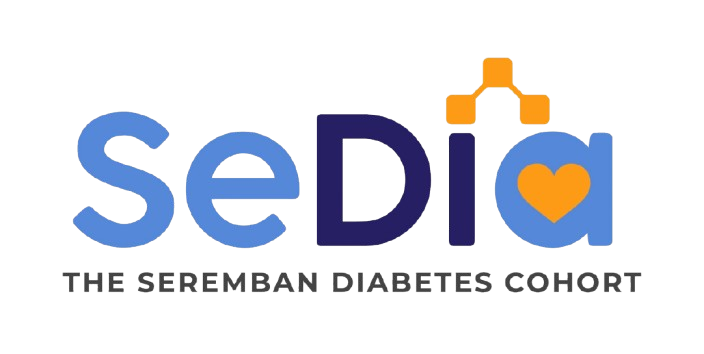About SeDia Cohort
Background
The SeDia cohort is a 12-year longitudinal, open observational study involving previously diagnosed and newly diagnosed diabetes patients registered with the National Diabetes Registry (NDR) at Seremban, along with their household family members and unrelated non-diabetic individuals residing in Seremban. The study aims to recruit 9,770 participants, comprising 3,650 diabetes patients, 4,600 household family members, and 1,520 unrelated non-diabetic individuals.
The SeDia cohort is established in Negeri Sembilan due to its high prevalence of diabetes mellitus, which stands at 33.2%—the highest among all states and regions in Malaysia. Additionally, the demographic composition of Negeri Sembilan closely mirrors that of the overall Malaysian population in terms of racial distribution, socioeconomic status, and other key factors.

The lack of real-world longitudinal data is limiting the translation of diabetes precision health in the country.
Most of the diabetes cohort studies conducted had limitations as follows:
- Majority of the studies focus on western population with minimal involvement of Asian. Furthermore, the socio-demographics and culture might be completely different for Malaysian and may not be directly interpretable into the Malaysian context.
- Lack of longitudinal studies on the family factors and gene environment in regard to diabetes
- Most of these studies are considered “opportunistic” and focused on understanding limited factors in isolation and oversimplified complex relationships.
- Most studies were using conventional methods and did not capitalise on the growing importance of capturing multi-dimensional data using state-of-the-art digital health technology.
Why do we need to set up a diabetes cohort?

- To address the needs of the country in understanding the causal-effects relationship of diabetes in Malaysia
- To address the non-linear interactions among genetics/physiology, lifestyle, psycho-social factors, socio-economy, and healthcare delivery in the prevention, management, and control of diabetes
- To utilise mobile technology, electronic health records and genomics technology to capture multidimensional data from the same individual in the most cost-effective manner, creating opportunities for innovations in achieving better diabetes outcomes
- To incorporate both observational and interventional elements in the same cohort for comparative effectiveness analyses
SeDia Cohort is established, maintained and governed as a collaborative public-private partnership between the Ministry of Health (MOH), Malaysia and the IMU University, Kuala Lumpur. Ministry of Health will be represented by Negeri Sembilan Health Department and Seremban District Health Office.


